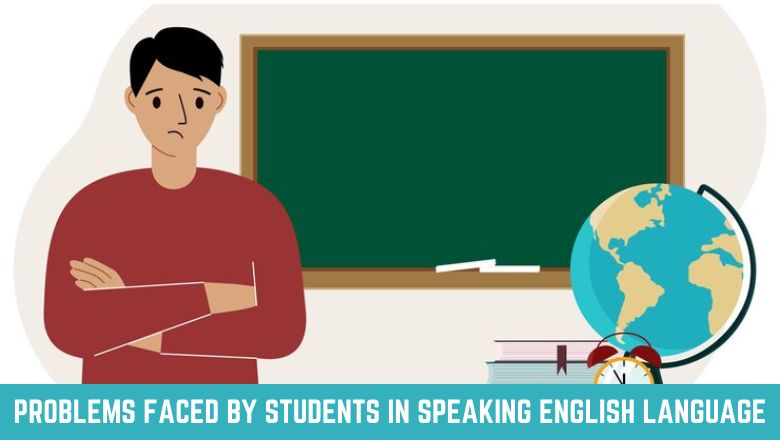In this article, you will get to know all details about “Problems Faced By Students In Speaking English Language“.
- Problems Students Face in Speaking the English Language
- 1. Common Grammar Mistakes While Speaking English
- 2. The inability to speak the English language with confidence
- 3. Feelings of shyness when speaking in English
- 4. Frustration at the thought of making mistakes in the English Language
- 5. Students do not have the motivation to speak the English language
- 6. Anxious when it comes to speaking the English language in public
- Important PDF Files:
In order for students to be able to speak English fluently, what obstacles must they overcome?
Today’s people must be fluent speakers of English in order to function effectively in modern society, as English is the world’s international language.
Almost every country in the world understands the English language. The English language has become increasingly important in modern societies.
Those who aren’t native English speakers should learn English as soon as possible.
People who speak different languages and belong to different regions can communicate and share thoughts using the English language.
The English language is being studied and learned all over the world. English is taught and learned in most countries as a compulsory subject.
For the sake of surviving in foreign countries, students who go abroad for studies must understand and speak English.
The English language is studied from primary school through university; students spend about 16 years in school studying it.
Why are students not able to speak English fluently even after 16 years of learning the language? Why do students still have difficulty speaking English despite learning the language for 16 years?
Why students cannot understand and speak English after 16 years of learning is a very serious issue that needs to be addressed.
The purpose of this article is to discuss the issues students face when speaking English.
Problems Students Face in Speaking the English Language
The following are some of the problems students face:
1. Common Grammar Mistakes While Speaking English
There were many grammatical errors made by the students when speaking.
Students have a hard time learning English grammar. The majority of students make grammar mistakes when they speak English.
Often, students make mistakes in tenses, active and passive voices, and vocabulary when speaking English.
Sometimes they used the wrong tenses, speaking in the present tense instead of the past tense even though they wanted to use the past tense. Tenses such as past, present, and future are difficult for them to distinguish.
2. The inability to speak the English language with confidence
There is a lack of confidence among students when it comes to speaking English in public.
It makes them uncomfortable to speak English in public. In most cases, teachers are responsible for this, since they do not provide enough encouragement to speak in public in English.
In the classroom and with people in front of them, most teachers do not encourage them to speak English.
Although they are taught the English language, they lack the ability to speak it. The inability to speak in public is one of the most common problems students face in the classroom.
A student cannot speak English if they don’t believe in themselves; if a student doesn’t believe in themselves, they will not be able to speak it.
Teachers provide students with self-confidence and help them grow their belief systems. In order for students to speak the English language confidently in public, teachers must motivate and inspire them to believe in themselves.
The teachers must teach the students that mistakes happen and that everyone learns from them.
Despite their incorrect speech, they remain confident. By learning from their mistakes, they will be able to speak better in the future. The English language requires self-confidence, so it is very important to have it.
3. Feelings of shyness when speaking in English
Students’ shyness is another reason why they have difficulty conversing in English in class. When speaking English, students experience it.
There is a reluctance on the part of the students to face their teachers and their friends. As a result of being shy, they are unable to express what they are feeling and what they want to say.
In addition to being shy, they lack the self-confidence to speak, have a limited vocabulary, and have a poor understanding of grammar.
Their shyness causes them to become nervous when speaking English in front of others. It is important for teachers to encourage students to overcome their self-doubt so that they won’t feel intimidated by speaking in front of others. Their shyness must be overcome if they are to speak English confidently.
4. Frustration at the thought of making mistakes in the English Language
Students also fear making mistakes when speaking English, which is a common problem.
Speaking English allows you to communicate with other people who also speak the language.
When they make mistakes in speaking English, they fear being ridiculed or criticized by their classmates. It has been difficult for people to interact with English speakers due to their fear of making mistakes.
Making mistakes is a normal part of life. We all make mistakes, but if they want to master the English language, they must learn from their mistakes and overcome them.
5. Students do not have the motivation to speak the English language
Lack of motivation also contributes to students’ inability to speak English well. Because of this, they were not interested in learning English. It is extremely important to be motivated in order to learn the English language. It is possible for teachers, peers, and even parents to motivate students.
6. Anxious when it comes to speaking the English language in public
A student’s anxiety or nervousness may also prevent them from speaking in public or in front of others. Thus, the nervous students are unable to communicate in English in public.
In order to be successful when speaking in public, students must overcome their nervousness. English speakers can keep the following things in mind when speaking it.
Students who feel nervous about speaking English in public should breathe properly, stay calm, and recall the reasons they started learning the language in order to feel more relaxed and confident.
Important PDF Files:
Some visitors asked for pdf files, so I am uploading them here.
Problems Faced By Students In Speaking English Language PDF |
Download PDF File |
Final Thoughts
There are several reasons why students still cannot speak English after learning the language for more than 16 years. They need to focus on these problems and try to solve them. Their students should be able to speak English fluently.
Teachers need to create the right environments for students to interact with one another and ask questions.
It takes practice to learn the English language. In other words, it’s being able to speak English fluently with others and in public.
Instead of studying from books and exercises, English should be taught through oral communication by teachers.
Students are more likely to learn, communicate, and interact with others when they have oral communication skills.
In the comment section below, please let me know if you have any questions. Please let me know if you have any thoughts about this article.
Your reading of this is greatly appreciated. Keep learning and reading with Rehmat Ullah.

